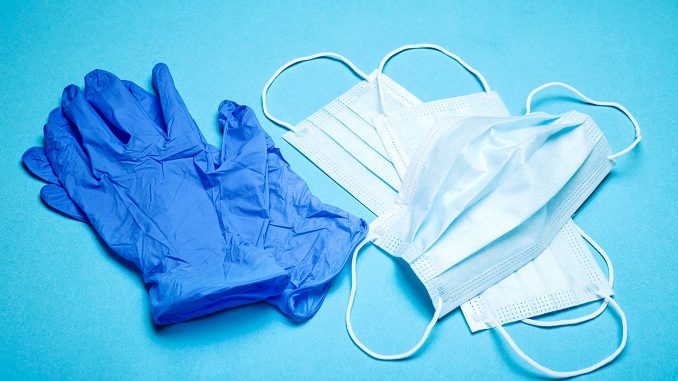
How not to wear a face covering or mask
The coronavirus is here for the long haul! The future will depend on social mixing and the prevention that we have in place and how we comply with that.
Wash your hands often – if soap and water are not readily available, use a hand sanitizer that contains at least 60% alcohol. Cover all surfaces of your hands and rub them together until they feel dry.
Avoid close contact – everyone should wear a mask in public settings and when around people who don’t live in your household.
Clean and disinfect – clean and disinfect frequently touched surfaces daily. This includes tables, doorknobs, light switches, countertops, handles, desks, phones, keyboards, toilets, faucets, and sinks.
Monitor Your Health Daily – be alert for symptoms. Watch for fever, cough, shortness of breath, or other symptoms of COVID-19.
Face coverings must be worn by customers in shops, supermarkets and shopping centres. Shop workers will now also have to wear a face covering.
Face coverings are compulsory for anyone travelling by public transport in England, Scotland and Wales, unless they have an exemption or a reasonable excuse. People can be refused travel if they do not follow the rules and can be fined as a last resort.
Face coverings are also compulsory in a number of indoor spaces. These include:
Some people do not have to wear a face covering. They include:
You can take off your mask if:
World Health Organization (WHO) advice says non-medical face coverings should be worn in public where social distancing is not possible.
Coronavirus is spread when droplets are sprayed into the air when infected people talk, cough or sneeze. Those droplets can then fall on surfaces.
The WHO says there is also emerging evidence of airborne transmission of the virus, with tiny particles hanging in aerosol form in the air.
Homemade cloth face coverings can help reduce the spread from people who are contagious but have no symptoms or are yet to develop symptoms. Taking a face covering on and off can also risk contamination, the WHO says.
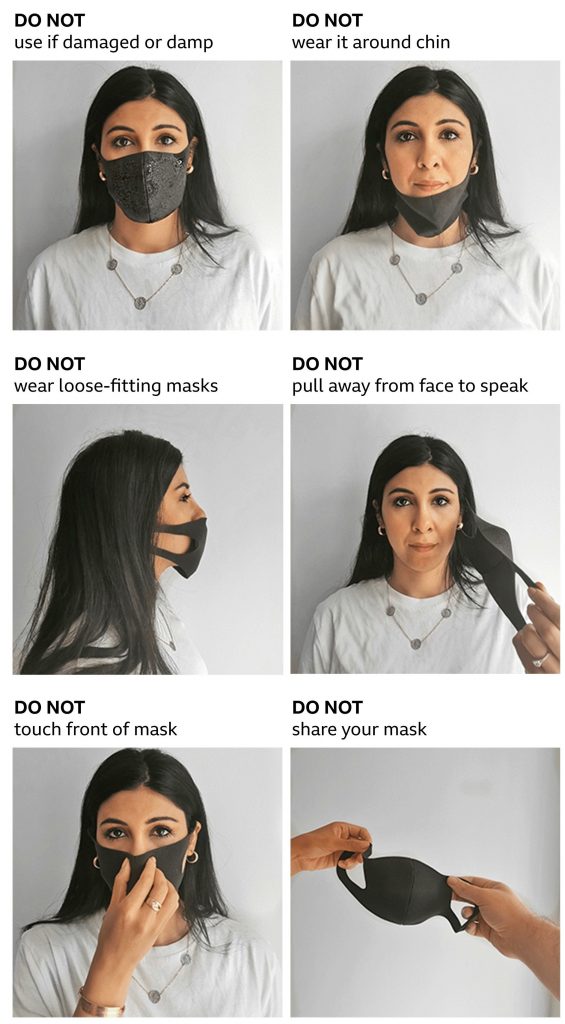
Contact us if you require further information.
Thank you to Royal Devon and Exeter NHS Foundation Trust for the mask infographic.
Information correct at time of publishing.
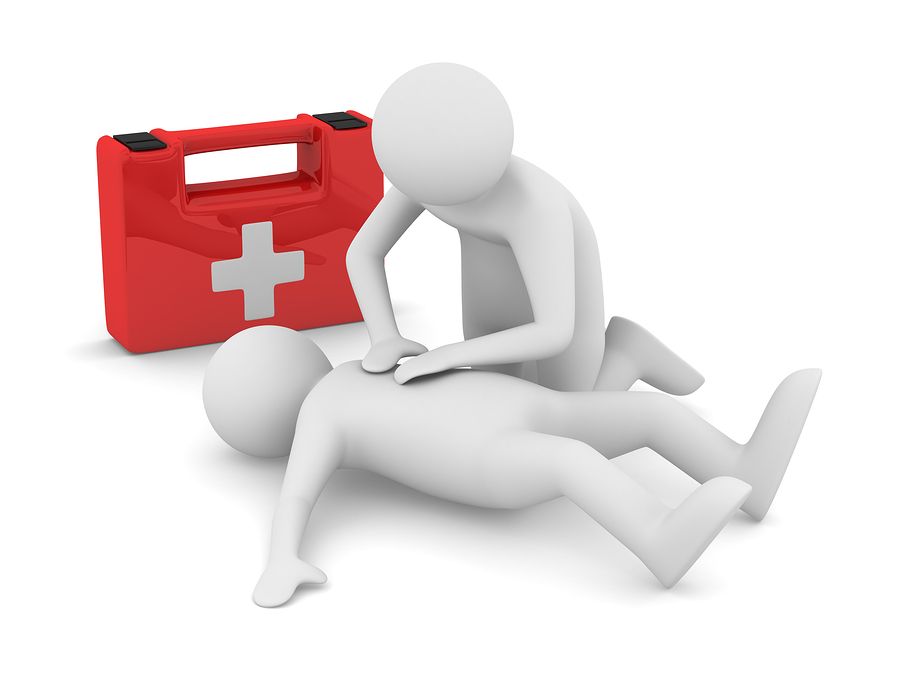
First Aid Cover During Reduced Staffing as a Result of Covid-19
If first-aid cover for your business is reduced because of coronavirus (perhaps your first aiders are furloughed or working from home) or you can’t get the first-aid training you need, there are some things you can do so that you still comply with the law.
You should review your first aid needs assessment and decide if you can still provide the cover needed for the workers that are present and the activities that they are doing.
If there are fewer people coming into your workplace, it may still be safe to operate with reduced first-aid cover. You could also stop higher risk activities.
You could share the first aiders of another business, but be sure that they have the knowledge, experience and availability to cover the first aid needs of your business.
Shared first aiders must:
Whoever provides the temporary cover must make sure they do not adversely affect their own first-aid cover.
If your first aiders hold a first-aid certificate that expires on or after 16 March 2020 and have not been able to access requalification training because of coronavirus, they may qualify for a three-month extension. This applies to the following courses:
To qualify for the extension, you must be able to explain why they have not been able to requalify and demonstrate what steps you have taken to access the training, if asked to do so.
Courses are now available for requalification. In England, the final deadline for requalification for these qualifications is 30 September 2020. There is no deadline yet for Scotland and Wales, but employers or certificate holders are encouraged to arrange requalification training as soon as they can.
There are also online options for first aid training. We use a company called IHASCO. Contact them by clicking here.
Contact us should you require further information.
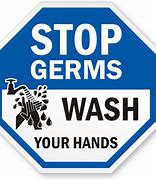
5 Dirtiest Public Places We Go to Every Day
As the number of COVID-19 cases start to fall and lockdown is eased across the country, it is more important to be aware of protecting ourselves and others from illness and do all we can to prevent the spread of germs.
Many of the places that we may visit on a daily basis try to promote cleanliness to ensure customers and employees are in a safe environment.
Here are 5 of the Dirtiest Public Places We may Go to Every Day!
The majority of offices have cleaners who regularly wipe down all the surfaces and remove visible dirt. However, offices can quickly become a hub to a lot of bacteria, you’d be surprised how much is lurking all around your workspace each day. Encourage staff to use antibacterial wipes and sprays to clean their work areas more frequently. Request that they limit sharing stationery.
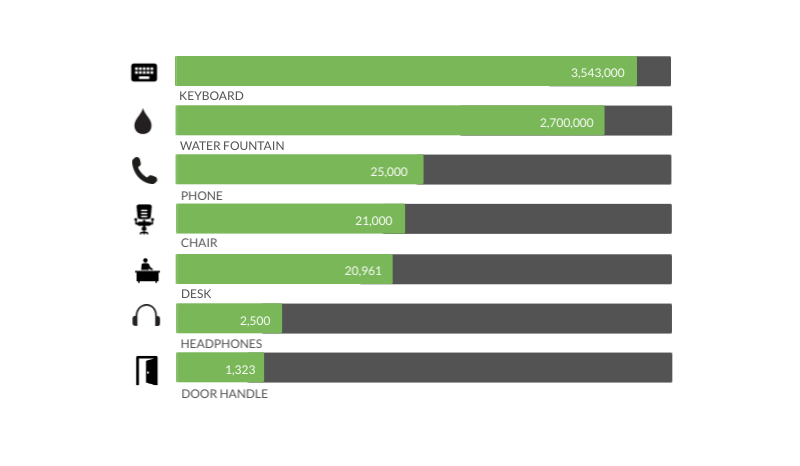
Estimated number of germs 5 Dirtiest Public Places We Go to Every Day
Most of us have to use public transport each day to commute to work. Unfortunately, trains and buses are often tightly packed spaces during the rush hour, which is an environment that bacteria thrive in. With 2 million people on average riding the tube every day, it’s safe to say that your daily commute is one of the places you’re most at risk of coming into contact with harmful bacteria. Ensure that you carry antibacterial gel and always wear a face covering.
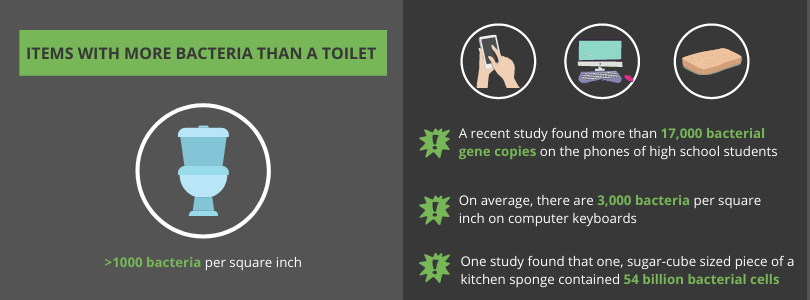
5 Dirtiest Public Places We Go to Every Day
Using public bathrooms is often unavoidable, however, it’s important that you make sure to wash your hands thoroughly and use hand sanitiser after using them. Surprisingly, however, there are many things you’ll come into direct contact with each day that contains far more bacteria than a toilet seat. Keeping hands clean is really important. Be mindful of what you touch or pick up.
Visiting a restaurant is often an experience we consider to be luxurious, however, once seeing how much bacteria can be harboured in these spaces, you might reconsider! From the high chairs to the menus, unfortunately, these are environments where bacteria can spread rapidly. With COVID-19 there are new procedures in place, so ordering from your mobile and paying with a card is becoming the norm.
It is true that the spaces where we buy our food and other essential items is a breeding ground for bacteria. Once returning home, you should thoroughly wash any fresh food you have bought and wipe down any packets, tins and packing to remove any bacteria you might have brought back with you. Only pick up items in a supermarket you intend to buy. It is now frowned upon to pick things up and return them to the shelf.
There are general principles you can follow to help prevent the spread of respiratory viruses, including:
• washing your hands more often – with soap and water for at least 20 seconds or use a hand sanitiser when you get home or into work, when you blow your nose, sneeze or cough, eat or handle food
• avoid touching your eyes, nose, and mouth with unwashed hands
• avoid close contact with people who have symptoms
• cover your cough or sneeze with a tissue, then throw the tissue in a bin and wash your hands
• clean and disinfect frequently touched objects and surfaces in the home.
Remember to look at the previous blogs for advice. They may be of benefit. Please feel free to forward our blogs onto your contacts, friends and family.
Remember to stay safe and be compliant!
Contact us should you wish to find out more.
Written with Guest Blogger Katherine Myers from https://elite-sec.com/

Actions to Take in the Event of a Coronavirus Outbreak at Work
Official Government guidance for England recommends that, as part of the risk management, employers should ensure they have an up-to-date plan in the event of an outbreak.
Guidance from the British Standards Institution recommends that organisations “should establish and communicate processes to manage suspected and confirmed cases of Covid-19”.
In the event of an employee (or other stakeholder) becoming unwell, organisations should ensure they have a procedure for immediate action that:
• requires any person becoming unwell to be treated as a potential Covid-19 case
• enables the person that is unwell to be isolated while awaiting first-aid assistance, transport home or assistance from medical professionals
• provides appropriate personal protective equipment to first-aid personnel and a face mask to the person who is unwell (taking account of any respiratory issues)
• ensures first-aid personnel are aware of procedures to follow as detailed by the Health and Safety Executive
• enables the person to return home (where medical assistance is not required) avoiding the use of public transport (eg collection by family member)
• encourages the staff member to seek a Covid-19 test and then inform the employer of the result of that test.
Where there is a known or suspected case, the organisation should put into action the necessary cleaning requirements as described in official Government/home nation guidance, including disposal of items of waste.
The BSI guide recommends that where a suspected or confirmed case is known, employers should “establish if an affected worker has been in close contact with other workers (eg performing work activities without physical distancing in a team or pair)”.
This will fall in line with requirements under the various UK test and trace regimes, which should form part of any process and planning for suspected or confirmed cases.
The planning should also include a process to determine if the case (when confirmed) requires reporting under RIDDOR as a work-related exposure.
If there is more than one case of Covid-19 associated with a workplace, employers should contact their local health protection team to report the suspected outbreak.
Remember to look at the previous blogs for advice. They may be of benefit. Please feel free to forward our blogs onto your contacts, friends and family.
Remember to stay safe and be compliant!
Contact us should you wish to find out more.

Spot inspections by HSE to ensure workplaces are Covid-secure
The Health and Safety Executive (HSE) is currently carrying out spot inspections in cities and towns where there are coronavirus outbreaks, to check that businesses are Covid-secure.
An inspection process involves checking that businesses are aware of the guidance, and advising where necessary on improvements needed to ensure the workplace is Covid-secure. Most recently, HSE conducted spot inspections on businesses in Bradford.
Working with other public local and national government authorities, inspectors are currently out and about visiting businesses, putting employers on the spot and checking that they are complying with the latest guidance.
Here are some practical steps that businesses can take to be Covid-secure before spot inspections are carried out by the HSE to ensure workplaces are Covid-secure:
HSE has been utilising a number of different ways to gather intelligence and reach out to businesses with a combination of site visits, phone calls and through collection of supporting visual evidence.
Some of the most common issues that HSE and local authority inspectors are finding, across the country, include failing to:
You have an absolute legal duty to monitor, maintain and review all matters and arrangements of health and safety. By adhering to the Audit requirement and process an Organisation will be able to demonstrate that health and safety is pro-actively managed in accordance with legislative, Insurers and Fire Department requirements.
An Audit will also act as a suitable defence in a court of law, should either Civil or Criminal proceedings be instigated.
Contact us for further information.
Keep Safe!